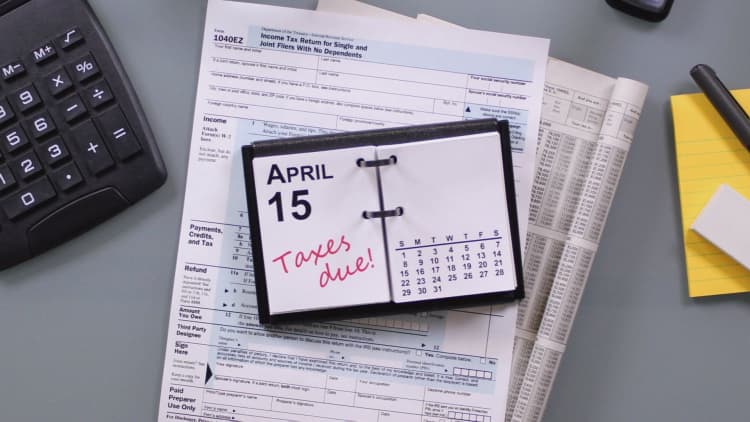We're only a couple of months into the new year, yet accountants are already drafting strategies to help their clients save on taxes under the new tax code.
A survey from the American Institute of Certified Public Accountants showed that 63 percent of affluent individuals said they were likely to tweak their financial planning strategies.
Last September and October, the organization took an online poll of 507 adults who have at least $250,000 in investable assets or more than $200,000 in household income.
The Tax Cuts and Jobs Act took effect this year, rolling out some major changes to the way individuals and businesses file their taxes. Key changes include the doubling of the standard deduction to $12,000 for singles and $24,000 for married couples who file jointly, the elimination of personal exemptions and sweeping changes to itemized deductions.

That means 2018 is the first year in what could be a decades-long planning process.
"You don't want to jump into the new tax law, figure something out and then stop making tax planning a priority," said Dave Stolz, a CPA and member of the AICPA's Personal Financial Specialist Credential Committee.
"Every year, there's a little tweak and it's a little clearer," he said. "Don't look at tax planning as a one-time event; it's an ongoing thing."
Here are a few strategies worth considering.
Pay off your home equity loan
Under the new tax law, you'll no longer be able to deduct the interest paid on your home equity loan or line of credit if you used the money for purposes other than buying or improving your dwelling.
Because you will no longer be able to deduct the interest against your taxable income, it's essentially costing you more money to keep this debt on your balance sheet. View the payoff of your HELOC in the context of your overall finances — not just the tax implications: How does this loan compare to higher interest debts you might owe?
"When you make the list of all your debt, there are other things to consider," said Stolz. "If you have a credit card, go for it first. The HELOC might have a lower rate."
Bunch your charitable contributions
The new tax law left in place charitable contributions, but you'll need to itemize your deductions in order to take them on your taxes.
About 49 million taxpayers, or 28 percent, currently itemize, according to the Urban-Brookings Tax Policy Center. Due to the higher standard deduction, fewer filers are expected to do so in the future.
An accountant can help you get over the standard deduction and itemize using a strategy called "bunching." This means that instead of donating assets to charity annually, you would aggregate two or three years' worth of contributions into one year.
Get an even bigger bang for your tax buck by donating highly appreciated assets instead of cash. This way, you avoid realizing capital gains on that asset if you were to sell it.
Deduction for business owners
If you're an entrepreneur, you may qualify for a 20 percent deduction against qualified business income. This break is available to pass-through entities, including S corporations and limited liability companies.
In general, to qualify for the full deduction, your taxable income must be below $157,500 if you're single or $315,000 if you're married and file jointly.
Beyond those thresholds, the law places limits on who can qualify for this deduction. Entrepreneurs with service businesses — including doctors, lawyers, and financial advisors — may not be able to take advantage of the deduction if their income is too high.
Because this portion of the new law has some ambiguity, some accountants say there's room for aggressive planning techniques to help entrepreneurs who otherwise wouldn't qualify for the full amount of the break.
"That section of the tax law is really open to interpretation on some things," said Stolz. "You can be aggressive, but you run the risk that a year from now, when the regulations are clear, you may have been doing it wrong."
Gift and estate planning
The new tax law doubled the gift and estate tax exemption to roughly $11 million per person. This means you can transfer up to this amount to others free of estate and gift taxes.
Work with your accountant to determine whether it's better for you to make outright gifts of your wealth or hold on to your assets until death.
An asset that you "gift" to someone else will be removed from your estate, but your recipient misses out on a step-up in basis. That means he will pay capital gains taxes if he sells the asset right after receiving it.
Meanwhile, wealth transferred at death qualifies for the step-up in basis, sparing recipients the capital gains bite if they sell an appreciated asset.
Now is also a good time to work with your CPA and estate planning attorney to revisit your will. That's because documents drafted under the old law may call for funding a trust up to the "estate tax exemption amount" rather than a specific dollar figure and passing the remainder to a beneficiary.
This tactic may have worked in the past: An $11 million estate belonging to someone who died in 2017 would have $5.49 million going to the trust and the remaining $5.51 million going to the beneficiary. If this person died in 2018, however, this same $11 million estate could have all of the money going to the trust and none of it held for the beneficiary.
More from Personal Finance:
Grab these expiring tax breaks while you still can
Bunching charitable deductions can help you save on taxes
Tax bill creates a possible $11 million windfall for your kids
WATCH: These tax deductions are about to disappear



